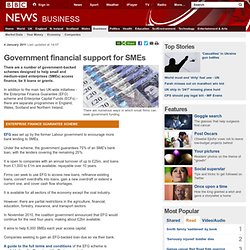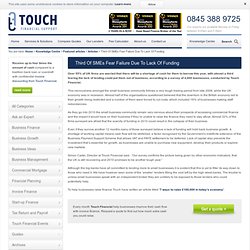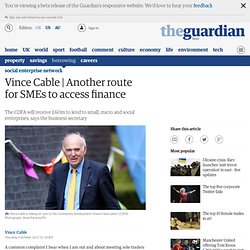

Government financial support for SMEs. 4 January 2011Last updated at 14:07 There are numerous ways in which small firms can seek government funding There are a number of government-backed schemes designed to help small and medium-sized enterprises (SMEs) access finance, be it loans or grants.

In addition to the main two UK-wide initiatives - the Enterprise Finance Guarantee (EFG) scheme and Enterprise Capital Funds (ECFs) - there are separate programmes in England, Wales, Scotland and Northern Ireland. EFG was set up by the former Labour government to encourage more bank lending to SMEs. Under the scheme, the government guarantees 75% of an SME's bank loan, with the lenders covering the remaining 25%. It is open to companies with an annual turnover of up to £25m, and loans from £1,000 to £1m are available, repayable over 10 years.
Firms can seek to use EFG to access new loans, refinance existing loans, convert overdrafts into loans, gain a new overdraft or extend a current one, and cover cash flow shortages. Third Of SMEs Fear Failure Due To Lack Of Funding. Over 55% of UK firms are worried that there will be a shortage of cash for them to borrow this year, with almost a third fearing the lack of lending could put them out of business, according to a survey of 4,000 businesses, conducted by Touch Financial.

This nervousness amongst the small business community follows a very tough trading period from late 2008, while the UK economy was in recession. Almost half of the organisations questioned believed that the downturn in the British economy led to their growth being restricted and a number of them were forced to cut costs, which included 16% of businesses making staff redundancies. As they go into 2010 the small business community remain very nervous about their prospects of accessing commercial finance and the impact it would have on their business if they’re unable to raise the finance they need to stay afloat.
Almost 32% of the firms surveyed are afraid that the scarcity of funding in 2010 could result in the collapse of their business. Businesses find it easier to get finance. Sources of finance for business. An activity that looks at cash flow for Level 2.

Introduction Whether you are thinking of starting up your own business or if an existing business is thinking of expanding, it is likely that money will be needed. The money needed to start a business is called business finance. Where do businesses get the finance to start a business or to finance expansion? This resource will look at some of the possibilities. For an individual thinking of setting themselves up as a mobile sandwich van, the sources of finance are going to be quite different to that needed and available by someone like Liverpool Football Club when trying to build a new stadium.
Liverpool FC are planning to build a new stadium to replace the famous Anfield stadium. Sources of finance for startups and SMEs. Author: Jim Riley Last updated: Sunday 23 September, 2012 Sources of finance for a start-up business Introduction Often the hardest part of starting a business is raising the money to get going.

The entrepreneur might have a great idea and clear idea of how to turn it into a successful business. However, if sufficient finance can’t be raised, it is unlikely that the business will get off the ground. Raising finance for start-up requires careful planning. How much finance is required? The finance needs of a start-up should take account of these key areas: Set-up costs (the costs that are incurred before the business starts to trade) Starting investment in capacity (the fixed assets that the business needs before it can begin to trade) Working capital (the stocks needed by the business –e.g. r raw materials + allowance for amounts that will be owed by customers once sales begin) Growth and development (e.g. extra investment in capacity)
Another route for SMEs to access finance. A common complaint I hear when I am out and about meeting sole traders or entrepreneurs is the struggle to get finance through mainstream sources.

This is a serious challenge to UK growth. It's why I have made it one of my priorities to get credit flowing again and why only last week I announced further detail of the government-backed Business Bank. This will facilitate the provision of loans to more firms through banks and other financial institutions. But what about those firms and organisations which still need finance but struggle because they are deemed more risky and too expensive to administer in disadvantaged areas.